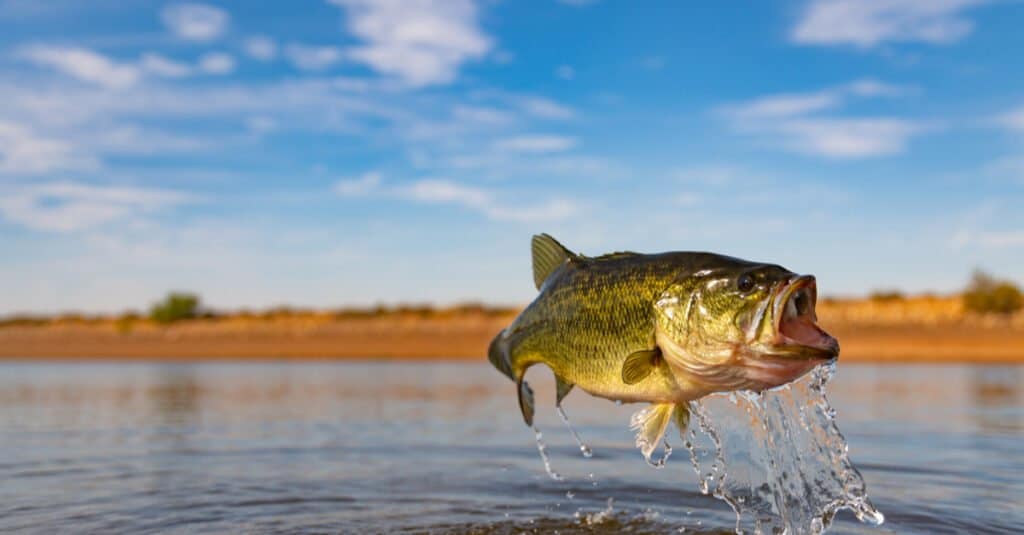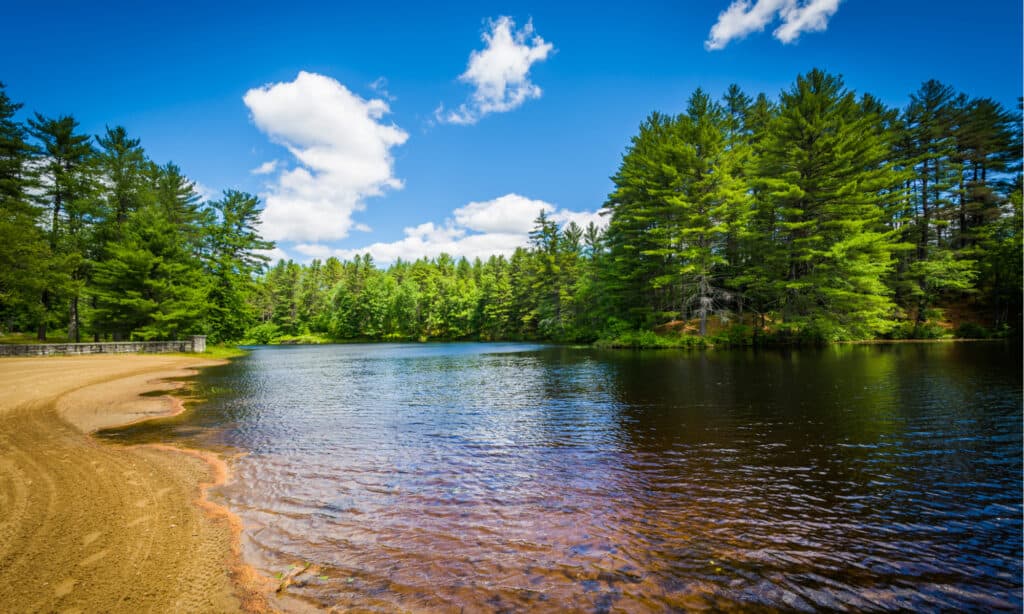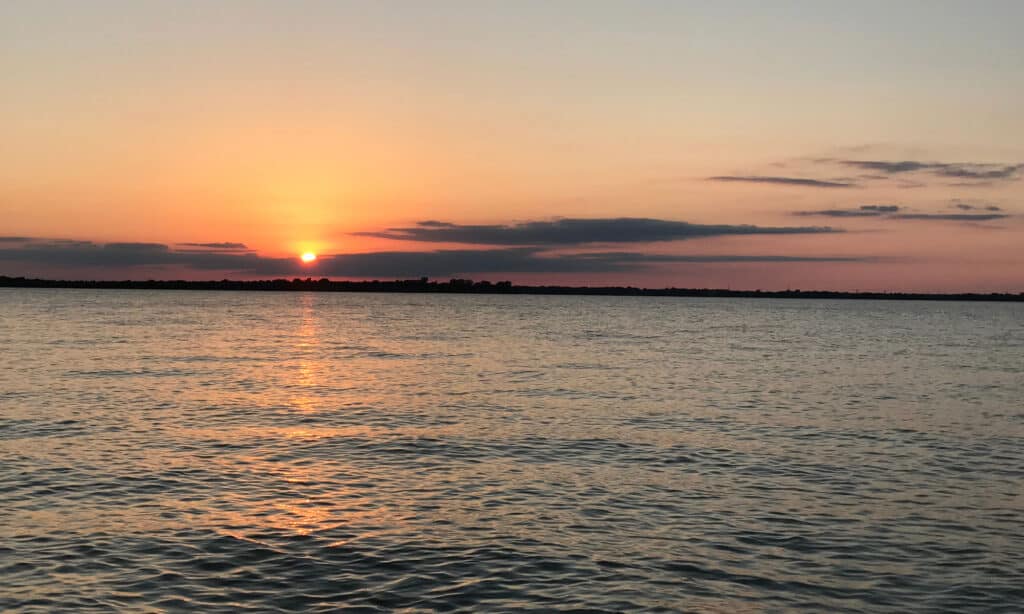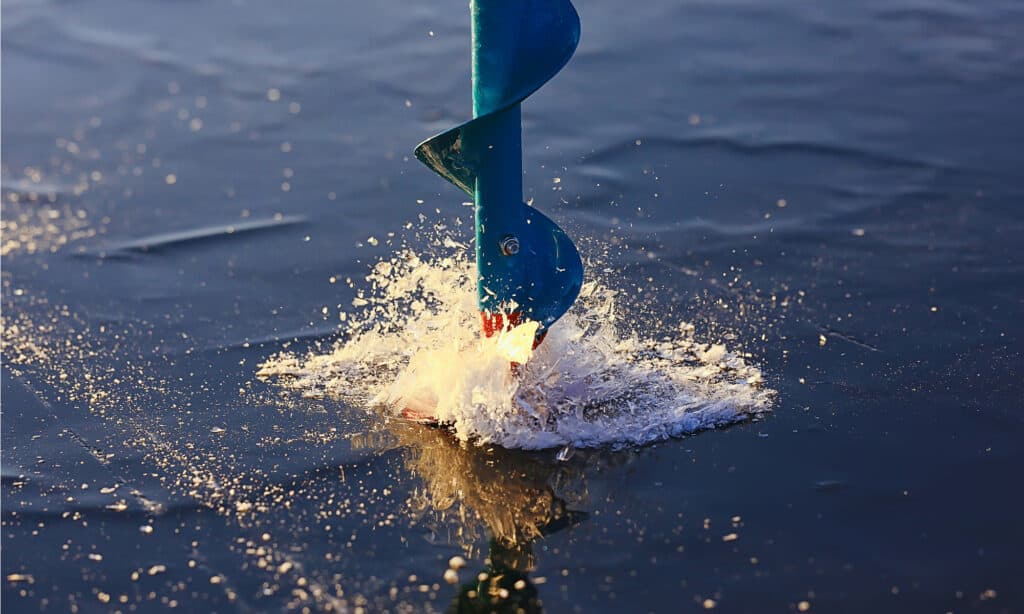
The largemouth bass is a member of the sunfish family. The largemouth bass is a popular sports fish. You can find largemouth bass worldwide.
©Ryno Botha/Shutterstock.com
Largemouth bass (Micropterus Salmoides) belong to the sunfish family. Originally residing in the Eastern United States, this popular sports fish is one of the most widely distributed species worldwide! These fish are known for putting up a fierce fight, making the thrill of the catch all the more exciting.
Every year novice and veteran anglers compete to break the state record for the biggest catch. A lot of anglers make their way to New Hampshire.
What’s the largest largemouth bass ever caught in New Hampshire? Read on to find out.
What’s the Largest Largemouth Bass Ever Caught in New Hampshire?

The largest largemouth bass ever caught in New Hampshire was found in Lake Potanipo.
©Jon Bilous/Shutterstock.com
The largest largemouth bass ever caught in New Hampshire was 10lbs 8 oz, by G. Bullpit. The trophy-sized fish was 25.8 inches long.
G. Bullpit set the record in May of 1967 in the town of Brookline, New Hampshire. The unsuspecting largemouth bass was swimming around in Lake Potanipo.
To put the size into perspective, 10 lbs is the same weight as an adult cat. That’s a lot of fish to reel in! However, it’s not the biggest largemouth bass ever caught.
Biggest Largemouth Bass Ever Caught Worldwide

The world record for the largest bass ever caught was 22 lb, 4 oz by George Perry.
©wael alreweie/Shutterstock.com
The largest largemouth bass ever caught worldwide was 22 lb, 4 oz, by George Perry. On June 2, 1932, George Perry set the undefeated world record.
The trophy-sized fish was caught out of Lake Montgomery in southern Georgia. The record became one of the oldest world records for coveted saltwater and freshwater species.
Japan Sets World Record Tie
On July 2, 2009, Manabu Kurita of Japan caught a largemouth bass that weighed 22 lb and 4.97 ounces. Manabu Kurita’s fish was an official tie for the world record of the largest largemouth bass ever caught. The incredible catch came 77 years after George Perry’s world record.
The fish Manabu Kurita caught was a Florida-strain largemouth bass. The monster fish was swimming around Lake Biwa, near Kyoto.
If Manabu Kurita’s bass weighed 10lbs and 4.97 oz, why didn’t it break the world record of 10 lbs 4 oz? The International Game Fish Association (IGFA) rules declare that a fish must be 2 oz or more significant than the previous record.
Manabu Kurita’s catch was less than 1 oz bigger than George Perry’s. But it still qualified for a tie!
Best Largemouth Bass Fishing Lakes in New Hampshire

The largemouth bass prefers to swim near shorelines. The early morning and late evening are the best times for catching bass.
©Agarcia5720/Shutterstock.com
Largemouth bass love swimming in New Hampshire’s famous lakes. The best fishing spots are in the southern area of the state.
Early dawn and late evening are prime fishing windows for bass. You’ll usually find a lot of tons of fish swimming around clean lake shorelines.
Unlike smallmouth bass, the largemouth prefers lakeshores, ponds, and areas with lots of aquatic vegetation. Certain fishing spots, like Bow Lake, draw the attention of anglers across the state. There’s almost always bass just waiting for you to catch them!
Bow Lake
Bow Lake in New Hampshire is a popular spot for largemouth bass fishing. The 1200-acre lake sits in the Southeastern part of the state. Anglers can enjoy 7 miles of shoreline.
There are rocky areas, laydowns, and boat docks to explore. Along with largemouth bass, Bow Lake is an excellent spot for catching sunfish, perch, trout, and pickerel. When you’re done fishing, you can head over to one of New Hampshire’s fun aquariums to spot even more aquatic species.
Conway Lake
Conway Lake in New Hampshire has 19 miles of prime bass fishing shoreline. The famous fishing lake is 1,300 acres and sits in the northeastern part of the state—It’s only 4 miles North of Northwood. Anglers will also have a chance to catch salmon, perch, and trout.
Mascoma Lake
Mascoma Lake in New Hampshire is a prime spot for largemouth bass fishing. The 1100-acre lake sits in the West Central part of the state. Anglers will enjoy 10 miles of shoreline.
There are deep parts of the lake you can fish in that go down to almost 70 ft. Along with largemouth bass, anglers will have a chance to catch walleye, perch, crappie, and bluegill.
Largemouth Bass Ice Fishing in New Hampshire

The largemouth bass isn’t a coldwater species. During the winter largemouth bass become lethargic. Icefishing is a great way to catch slow-moving bass.
©Kichigin/Shutterstock.com
New Hampshire is a great place to go ice fishing for largemouth bass. During winter, you can find largemouth bass in Martin Meadow Pond and Warren Lake, New Hampshire.
When the lake ices over, they become lethargic–making them easier to catch. This is because the largemouth isn’t a coldwater species.
Icefishing Tips
Stay close to the shoreline when ice fishing for largemouth bass. The shoreline is where the bass can find a lot of their preferred aquatic vegetation.
Inactive bass like to lay in holding areas with a 25-30 ft range, seeking out soft bottoms. You’ll have to use slightly larger baits and heavier lines to reel in these large fish.
Hatch Date Impacts Largemouth Bass Length
Young bass constantly grow and develop. It can be challenging to say how long until they’re fully grown.
Their life cycle depends on the length of the growing season, hatch date, and water temperatures. A largemouth bass’s hatch date helps determine the length. Early-hatched largemouth bass grows to be larger than late-hatched fish.
Late-hatched largemouth bass grows the most initially. However, early-hatched fish catch up after the first month and continue to grow rapidly. Their enhanced size gives them the advantage of becoming piscivorous before late-hatched fish.
Being able to eat fish means the early-hatched largemouth bass can continue to grow exponentially during the fall. By winter they have plenty of lipid reserves.
Average Age and Survival Factors for Trophy Bass
At what age do largemouth bass reach trophy size? The ages for trophy-sized largemouth bass range from 4 to 16 years old.
There are a lot of different factors that impact a largemouth bass’s odds of surviving long enough to become a monster-sized fish.
During their first year of life, most young basses become eaten by predators. The ones who survive the juvenile stages risk being caught by anglers.
The adult largemouth bass is prone to infection and diseases because of environmental stressors. Low dissolved oxygen is one of the environmental threats basses face.
Considering all the challenges, it’s incredible when a bass survives long enough to reach trophy size. What does a bass eat to grow so large? Find out what a bass diet looks like now!
The photo featured at the top of this post is © iStock.com/stammphoto
Thank you for reading! Have some feedback for us? Contact the AZ Animals editorial team.






